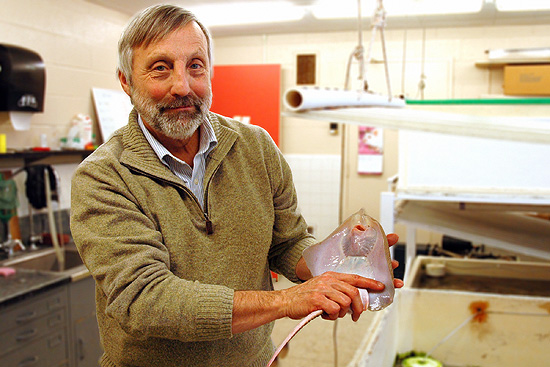New Dean of Sciences has Full Slate
 |
| David Bodznick, the new dean of the Natural Sciences and Mathematics, researches neuron signals in skate brains when he’s not busy with administrative duties. |
| Posted 01/22/07 |
| When David Bodznick took on the role as dean of the Natural Sciences and Mathematics in July 2006, he became, in essence, a part-time mediator. In his new position, the professor of biology, professor of neuroscience and behavior, works as the liaison between the Wesleyans science and mathematics faculty and the administration.
For example, I have the chance to present the needs and aspirations of the Division III faculty to the rest of the administration, Bodznick explains from his office in Shanklin, and the responsibility of presenting the wider perspective and long range planning goals of the Administration back to the faculty. Bodznick was nominated to the four-year position by former Natural Sciences and Mathematics Dean Joseph Bruno, who is the current vice president for Academic Affairs and provost, and professor of chemistry. Brunos nomination came after hearing input from colleagues. They cited Bodznicks expertise and experience working as the director of Graduate Studies and chairing the Biology Department. The position encompasses the departments of Astronomy, Biology, Chemistry, Earth and Environmental Sciences, Math and Computer Science, Molecular Biology and Biochemistry, Physics and Psychology, and the Neuroscience and Behavior Program. What really attracted me to the dean position was that it involves a lot of problem solving, he says. I enjoy trying to find the best solution that works most effectively toward the goal that needs to be met. Bodznick has already set short and long term goals for himself. For one, he wants to continue where Bruno left off, raising awareness and the visibility of the sciences at Wesleyan to the larger Wesleyan community and to the outside world. He looks for ways to support the continued successes of the science and math faculty in both teaching and research, and he encourages them to share their research with their students and the media. He mentions the outstanding research on stem-cells and neuron replacement that are part of the recent Connecticut Stem Cell Initiative as a great example of the important work going on throughout the sciences at Wesleyan. Bodznicks own research is on neuron signaling in the brains of vertebrates including marine fishes. In fact, every summer, Bodznick and his students move their lab equipment to the Marine Biological Laboratory in Woods Hole, Mass. There, the group is among 300 neurobiologists from all over the world working on research. As dean, Bodznick will also work with the Science Advisory Council, which comprises several Wesleyan alumni and Board of Trustee members, to find ways to increase outside funding for undergraduate and graduate science programs. He hopes to increase the applicant pool for science majors and offer additional courses for non-science majors. Too many Wesleyan students graduate without taking science courses, despite the fact that now, more than ever before, science literacy is a critical part of a liberal arts education, Bodznick says. We need to continue offering a large number of attractive, palatable classes for non-science majors so theyll want to include science courses in their curriculum. The deans heaviest workload falls on the new science centers planning. This facility will house three departments and will likely replace Hall-Atwater, which has exceeded its useful lifespan. Bodznick, Wesleyans own facilities experts and a building committee of faculty, students and trustees, are meeting with architects. They are discussing the new buildings feasibility options from the size and location to program planning, and a renovation of Shanklin. Groundbreaking is expected by the end of 2009. The at-home handyman says the new science center is one project hes very excited about. To work on this from the beginning to end and see the ground breaking will be a major accomplishment, he says. Theres a lot to be decided and a lot of problem solving to do. With his plate full of administrative duties, Bodznick has to devote less time to teaching, however it hasnt affected his research or interaction with Wesleyan students. He offers to present lectures in other classes, attends biology and neuroscience graduate student meetings and meets regularly with his four lab students. Next year, he expects new undergraduates to join his research group, and he looks forward to teaching them the methods of the lab. Ask anyone and theyll tell you the best thing about working at Wesleyan is the students, Bodznick says. Id never want to lose contact with the students, so I do what I can to interact with them, even when Im not teaching as much. |
| By Olivia Drake, The Wesleyan Connection editor |

